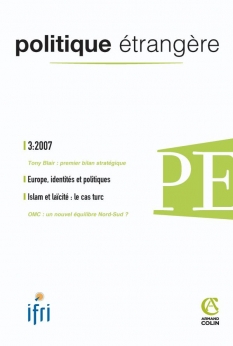
Politique étrangère n° 3/2007
Pour acheter ce numéro, contactez-nous
Recevez les numéros de l'année en cours et accédez à l'intégralité des articles en ligne.
Les conceptions de la laïcité sont diverses en Europe. En Turquie, le contrôle « par le haut » du fait religieux a été utilisé pour renforcer l’unité nationale face aux tendances centrifuges. Mais les excès de ce contrôle favorisent une islamisation « par le bas », par les partis et les acteurs sociaux. C’est à la lumière de l’ambiguïté turque sur les questions religieuses que peuvent être appréciées les victoires électorales de l’AKP.
Turkey is the only Muslim country in which laicism is enshrined in the constitution. State, politics and society in Turkey are for the most part secularized. Moreover, Islam in Turkey has been politicized in two distinct ways : by the state, in order to secularize the population, homogenize different ethnical and confessional groups and preserve the country’s territorial integrity by propagating a republican and ethno-nationalist state Islam ; and by parties and social groups, so as to break the Kemalist monopoly on the interpretation of Islam and end restrictions on religious freedom. On the whole, the Kemalist interpretation of laicism is authoritarian and undemocratic. The extent to which it can serve as a model for other Muslim countries is therefore limited.